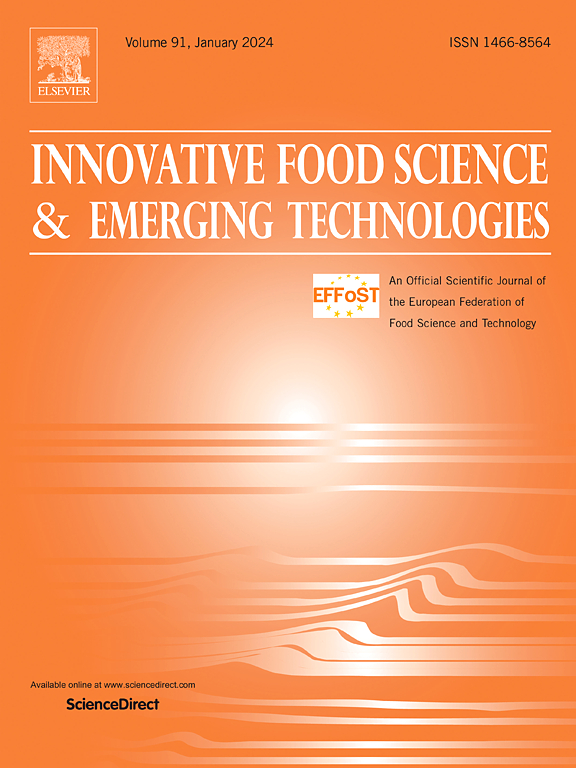Development of a feedback-regulated temperature control system to enable supercooling reversion in beef preservation
IF 6.8
1区 农林科学
Q1 FOOD SCIENCE & TECHNOLOGY
Innovative Food Science & Emerging Technologies
Pub Date : 2025-08-23
DOI:10.1016/j.ifset.2025.104199
引用次数: 0
Abstract
Supercooling preservation offers significant advantages for maintaining food quality by delaying ice crystal formation, however, owing to its inherent thermodynamic instability, sustaining the supercooled state of food matrices is difficult. To address this limitation, we developed a temperature-feedback control-based supercooling (TFCS) system that extends the supercooled state of beef tenderloins and reverts it to supercooling by inducing immediate micro-thawing upon ice nucleation. TFCS is equipped with modules for temperature monitoring to detect ice nucleation events and control the electric resistance heater for micro-thawing. During the 7-day storage tests at −5 °C, as up to three nucleation events occurred, TFCS effectively responded to these events and continuously prolonged the supercooled state, as intended. All beef samples stored with TFCS maintained superior freshness in terms of color presevation, texture, and microstructure compared to those stored using conventional refrigeration and freezing. These findings suggest that the temperature-responsive feedback control module, incorporating ice nucleation and micro-thawing, enables the practical application of supercooled preservation in commercial settings.
开发一种反馈调节温度控制系统,使牛肉保存中的过冷还原成为可能
过冷保存通过延缓冰晶的形成为保持食品质量提供了显著的优势,然而,由于其固有的热力学不稳定性,维持食品基质的过冷状态是困难的。为了解决这一限制,我们开发了一种基于温度反馈控制的过冷(TFCS)系统,该系统可以延长牛里脊的过冷状态,并通过诱导冰核后的即时微解冻将其恢复到过冷状态。TFCS配有温度监测模块,用于检测冰核事件,并控制电阻加热器进行微解冻。在- 5°C的7天储存试验中,当发生多达三次成核事件时,TFCS有效地响应了这些事件,并如预期的那样持续延长了过冷状态。与使用传统冷藏和冷冻方法储存的牛肉样品相比,使用TFCS储存的牛肉样品在颜色保存、质地和微观结构方面都保持了更高的新鲜度。这些发现表明,结合冰核和微解冻的温度响应反馈控制模块,使过冷保存在商业环境中的实际应用成为可能。
本文章由计算机程序翻译,如有差异,请以英文原文为准。
求助全文
约1分钟内获得全文
求助全文
来源期刊
CiteScore
12.00
自引率
6.10%
发文量
259
审稿时长
25 days
期刊介绍:
Innovative Food Science and Emerging Technologies (IFSET) aims to provide the highest quality original contributions and few, mainly upon invitation, reviews on and highly innovative developments in food science and emerging food process technologies. The significance of the results either for the science community or for industrial R&D groups must be specified. Papers submitted must be of highest scientific quality and only those advancing current scientific knowledge and understanding or with technical relevance will be considered.

 求助内容:
求助内容: 应助结果提醒方式:
应助结果提醒方式:


